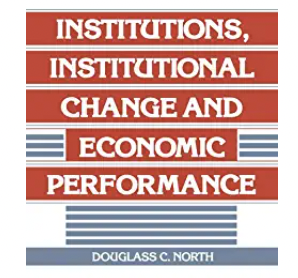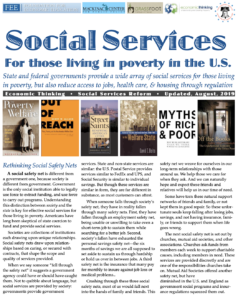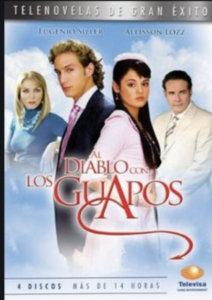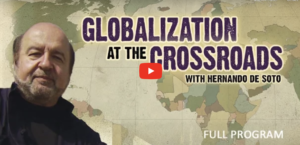Injustice not Inequality is What Matters for Equity
No easy answers for questions about wealth and poverty. Few rich people want to be poor but many with low-incomes wish they were rich or at least earned more. People wonder about the sources of wealth or reasons for poverty for their own lives and for those around them. Watching news of the world, it’s not clear why so many in Asia, India, Africa, the Middle East, and Latin America are still so poor. Those in poor countries watching television and movies from the wealthy west wonder how people became so astonishingly rich.
Economic historians wonder too. Here is the first paragraph of “A Conceptual Framework for Interpreting Recorded Human History” a survey article by Douglass North, John Wallis, and Barry Weingast (NBER pdf online here):
The fundamental question of economic history can be asked in two ways: how did a handful of countries achieve sustained rates of economic growth and development in the late 18th and early 19th centuries? or why have most nations failed to achieve sustained economic growth over the last three hundred years? What historical process(es) have generated institutions in a handful of countries capable of sustained economic development in the twentieth century, while most countries still fail to develop thriving markets, competitive and stable politics, and cultures that promote deep human capital accumulation for most of their populations?
(Douglass North books on Amazon here. Feel free to “look inside”.)
Television viewers from poor neighborhoods and poor countries see the big houses or mansions, nice cars or Mercedes, and boats or yachts of the well-to-do and very rich. Maybe they are jealous or envious or just curious. But in the ongoing debate about income inequality, people care most about issues of justice and injustice. Everyday people know that some will have more income and wealth than others, just as they know some work harder and more carefully than others. No one seriously complains when capable and hardworking people earn higher incomes. Most want a society where hard work is the core source of fortunes, rather than fraud, corruption, political connections, or some kind of financial tricks.
Institutional stability and the rule of law is central to successful societies. Sound rule of law institutions allow everyday people to launch new enterprises and adjust operations as they search for better ways to develop goods and services for others.
In poor countries and in America’s inner cities, legal barriers make it harder and more expensive to gather the various regulatory permits, even for entry-level occupations like serving food, making or mending clothes, offer haircuts or braiding, transportation services and car repair. These issues are discussed in a study guide on Social Services for Those Living in Poverty (pdf:SocialServicesSG-Aug2019), prepared for a past debate topic. See especially page 4, featuring an interview with the author of Off the Books: The Underground Economy of the Urban Poor.
gather the various regulatory permits, even for entry-level occupations like serving food, making or mending clothes, offer haircuts or braiding, transportation services and car repair. These issues are discussed in a study guide on Social Services for Those Living in Poverty (pdf:SocialServicesSG-Aug2019), prepared for a past debate topic. See especially page 4, featuring an interview with the author of Off the Books: The Underground Economy of the Urban Poor.
Televised Rich: From Dallas to Al Diablo con los Guapos
The television show Dallas was broadcast around the world, years after it ended in the U.S.. With its stories of conflict and deception set in seriously large houses, fancy cars, and airplanes, the world glimpsed a make-believe world of Texas oil barons. The mansions, sports cars, limos, and designer clothes were the major attraction for viewers (who unfortunately learned little about entrepreneurship and the dynamic and innovative Texas oil industry).
Popular Mexican soap operas like Al Diablo con los Guapos (“Down with the Handsome Ones”) contrast the life of the rich with the life of their household help. Most of the wealthy in this show are portrayed as mean and vain, with business dealings often corrupt and simplistic. (I watched this show some years ago thinking it would help me learn Spanish. It didn’t. And I guess it was lazy thinking to learn a foreign language from a television show. I though my mind would be motivated by the attractive women wishing to better lives and relationships.)
contrast the life of the rich with the life of their household help. Most of the wealthy in this show are portrayed as mean and vain, with business dealings often corrupt and simplistic. (I watched this show some years ago thinking it would help me learn Spanish. It didn’t. And I guess it was lazy thinking to learn a foreign language from a television show. I though my mind would be motivated by the attractive women wishing to better lives and relationships.)
Some watch soap operas about the lives of the rich for much the same reasons they buy lottery tickets. It is fun to imagine winning and living rich. (Watching soap operas costs less than buying lottery tickets, and statistically provides about an equal chance of winning a fortune.)
Some economists and journalists claim incomes received by business and financial leaders have risen too high in recent decades and are unjustified. Robert Reich argues that the economic “rules of the game” aren’t written in stone, and can and would be rewritten “if our democracy were working properly.”
Such critics of capitalism rarely extend their complaints to the high incomes of movie and sports stars. The combination of skills, good luck, and market forces that shower millions on actors and sports figures are not so different from those that bring riches for successful entrepreneurs and business leaders.
Commentators on income inequality claim “financialization” of the economy “since the 1980s” allowed economic gains to flow to “Wall Street from Main Street.” Earlier posts discuss wage stagnation claims, with links to videos by Robert Reich and Don Boudreaux.
It takes time to sort out and discuss these various claims about income inequality.
Consider though the initial task gaining income from productive work. For anyone currently earning low or no income, productive work seems the ticket to increased prosperity. We develop skills when we work and as our knowhow for producing valued goods and services–our productivity–increases. As we learn to produce more and better goods and services for others, our income usually increases as well.
Laws and regulations make it harder to start enterprises, as discussed above, and also reduce opportunities for employment by limiting the hours worked or regulating how old people have to be before being hired for safe and suitable jobs. As Anatole France might have said, labor regulations limit access for the children of the rich as well as the poor.
The law, in its majestic equality, forbids the rich as well as the poor to sleep under bridges, to beg in the streets, and to steal bread. —Anatole France
Poor farmers around the world rely on the labor of their children, as even young children work at many tasks on the farm. Millions of families continue to migrate to cities around the world each year, escaping the low productivity of rural agriculture. Yet regulations in and around most cities exclude rural families from the legal system, pushing them into informal (extra-legal) occupations. Hernando de Soto’s research, books, and documentaries focus on the artificial barriers that misguided legal systems impose on the poor. (Similar legal barriers on property ownership, investment, and transportation limit development in rural areas.)
More on income inequality, Hernando de Soto, and Horatio Alger in earlier posts.

Hernando de Soto’s excellent Globalization at the Crossroads documentary streams online here.
And Johan Noberg’s Free or Equal? documentary is here. Free of Equal is directly on the economic freedom vs. equity Lincoln Douglas topic, by way of recent economic history.
